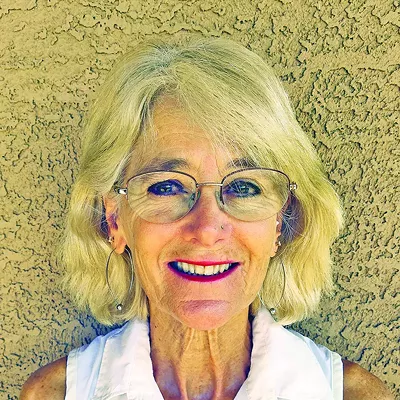The course was created by the University of Arizona's Center for the Philosophy of Freedom, which designed the curriculum, wrote the textbook and offers workshops for high school teachers instructing them on how to teach the class. The Freedom Center, which has been at UA since 2011, gets a majority of its funding from the Koch Brothers and a wealthy Arizona donor couple who are big contributors to and play an influential part in the Koch network.
The course is also being offered in the Amphitheater, Vail and Sahuarita school districts and at least seven private and charter schools in Pima and Maricopa counties.
The Center for the Philosophy of Freedom at the UA and similar centers at ASU are the latest in a continuing effort by the Koch Brothers to infuse institutions of higher education with their libertarian-fueled philosophy. The Koch's long term goal is for their economic and political views to filter down from the university into mainstream public opinion, and to use their influence with politicians to create legislation favorable to their ideological and economic interests.
A part of that effort is to create curriculum, class materials and entire courses to be used in high schools around the country.
In the 1980s, the Koch Brothers began buying their way into universities by setting up departments and think tanks. The Koch-funded centers lend scholarly credibility to the brothers' libertarian philosophy by teaching courses, writing papers for academic journals and conducting seminars for like-minded academics. The first serious funding venture began in the mid-1980s at Virginia's George Mason University. At the time the university wasn't known for the quantity or quality of its scholarship. Since then, it has grown, due to the Koch's money and influence, into the largest research university in the state.
Ground zero for the Koch's efforts at George Mason University is the Mercatus Center. The Washington Post described it as a "staunchly anti-regulatory center funded largely by Koch Industries Inc." A fellow at the Cato Institute, which was founded and funded by the Koch Brothers, referred to it as a "libertarian mecca."
Over the years, the Koch Brothers expanded their academic reach until they were subsidizing programs at more than 300 institutes of learning. From 2005 to 2015 alone, the Koch Foundation gave $145 million to universities, including $95 million to George Mason University and the Mercatus Center. Unlike most major university donors, the Kochs often maintain direct or indirect control over the departments their money creates and the professors they hire.
Scholarly work tends to be too detailed and complex for public consumption, so the Koch Brothers also fund institutes and organizations outside of universities to shape the academic material into more easily digestible form (the Cato Institute and the Heritage Foundation are two well known examples). Members of their staff generate position papers, write articles for magazines and newspapers, and appear on television news programs. They also work with sympathetic politicians to formulate and draft legislation.
University of Arizona's Center for the Philosophy of Freedom began in 2011. The Koch Brothers put in a million dollars to help start the center, though the largest portion of the funding came from Ken and Randy Kendrick, as well as another donor who remains anonymous. Ken Kendrick is the owner of the Arizona Diamondbacks. Randy Kendrick is a lawyer who is deeply involved in right wing causes. Because of their million-dollar-plus donations to the Koch's donor network, including support for the Mercatus Center, the Kendricks are charter members and influential players in the Koch network.
From its inception in 2011, UA's Freedom Center had its eye on Arizona's high schools. That year David Schmidtz, the founding director of the Center, spoke of his plans with Tim Vanderpool of the Tucson Weekly: "Schmidtz says the center plans to offer a degree program in economic instruction for high school teachers, and to generate texts for K-12 education. 'We aim not only to produce the teachers, but the materials that are getting taught.'"
Schmidtz is one of the three co-authors of Ethics, Economy, and Entrepreneurship, the textbook used in the high school course.
The Koch Brothers began their efforts to make inroads into high school education with Youth Entrepreneurs, which was founded by Charles Koch and his wife Elizabeth in 1991 as a program to teach basic business skills to young people. It expanded its mission in 2009 when it created what the organization referred to as "a high school free market and liberty-based course," complete with course materials and training for teachers. By 2014, more than 1,000 students were taking the course in Kansas and Missouri. YE has expanded into other states as well. It has a regional office Phoenix.
In 2014, the Freedom Center received a three-year, $2.9 million grant from the John Templeton Foundation with an emphasis on expanding the Center's mission into Arizona's high schools. Schmidtz is one of its project leaders. A page on the Templeton Foundation website explains the purpose of the grant, which "aims to foster research and produce curricular resources that will empower teachers (at the high school and college levels) to help students come to a deeper understanding of the nature of success and the virtues that are required to secure it in our distinctively American context. By 2025, activities funded by the grant will reach some 25,000 high school students — roughly 25 percent of Arizona's high school student population."
On the same page, Schmidtz discusses his concerns about the threat to freedom when governments play "expansive roles" in citizens' lives. His statement would feel right at home in an Ayn Rand novel.
"In a free society, metaphorically and literally, choosing destinations for citizens is the sole responsibility of individual citizens themselves," Schmidtz wrote. "More expansive roles for government tend to invite a tyranny that treats citizens as pawns to be moved around by rulers rather than by hopes and dreams of their own."
In 2015, Schmidtz, along with Cathleen Johnson and Robert Lusch, his two co-authors of the high school textbook, taught a course to 16 K-12 teachers from South Sudan and Rwanda. The course was written up on the website of the UA's Eller School of Management under the headline, "McGuire Center spreading ethical, entrepreneurial and innovation principles to South Sudan." It reads: "The objective is for participants to return to their own schools with a teaching and learning product that they are confident will be useful to their own students." It also says the course's instructors are working together with their companion centers at ASU "to educate K-12 teachers in Arizona and beyond."
In the summer of 2015, the Freedom Center led a workshop attended by 14 Arizona high school teachers on how to teach the course, "Ethics, Economy, and Entrepreneurship." The workshop used an online version of the textbook, which is currently available to students on a password-protected website. The book was published in 2016 by Tucson-based Sagent Labs, a for-profit company begun in 2014 by Cathleen Johnson. Tucson Unified first offered the yearlong course during the 2016-17 school year and now teaches it at four high schools. Students can earn dual credit at University of Arizona upon successful completion of the course.
Though the course is being used to fulfill the state economics requirement at Tucson Unified, the district is currently investigating whether it actually aligns with state guidelines. If it is not brought into alignment by next year, it will be taught as an elective.
On the Templeton Foundation website, the experiences of two Tucson High students who took the course are spotlighted as examples of the course's success in steeping students in the vision of individual liberty and free enterprise espoused by the Freedom Center. One student said he had planned to be a doctor, but the course expanded his thinking. "Now I'm recognizing the impact entrepreneurs have on society," he said. "I'd like to be able to do both."
The page describes another student's understanding of the virtuous nature of business and free enterprise.
"[He] understands that, ultimately, successful businesses in a free economy are virtuous at their core—meeting people's needs and doing so through ethical and mutually beneficial practices. In the end, [he] says, businesses that lack either virtuous purpose or ethical practices won't—and shouldn't—succeed."
Arizona students taking "Ethics, Economy, and Entrepreneurship" in four local school districts and private and charter schools around the state number in the hundreds, a far cry from the 25,000 goal set by the Templeton Foundation, but the Freedom Center has moved swiftly and effectively in Pima County. If it continues to focus on high schools and is allowed to spread its high school course to school districts around the state unimpeded, its vision of reaching 25 percent of Arizona's high school population is not outside the realm of possibility.








